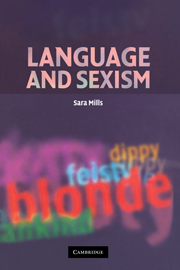Summary
Since the 1960s, the issue of sexist language has been keenly debated within feminist circles. The concern to change language which discriminated against women and which seemed to belittle and trivialise those activities associated with women was a key concern for feminist theorists and activists, trying to change the way that women were represented in advertisements, newspapers and magazines, and also the way that they were named and addressed in texts and in interaction. The debate has widened within recent years, so that ‘sexism’ and the more problematic ‘political correctness’ are no longer terms which only have currency within feminist theory but which are used by people outside the university context. However, both these terms ‘sexism’ and ‘political correctness’ are now used in ways which are often very different from their original feminist usage.
Whilst there are many definitions of sexism, one which is often cited is ‘the practices whereby someone foregrounds gender when it is not the most salient feature’ (Vetterling-Braggin, 1981). In this book, I interrogate this definition, since it seems to be based on a liberal-feminist notion that sexism is based on an error made by the speaker or writer which can be rectified when brought to their notice. It assumes a position of objectivity from which statements can be judged as sexist and from which gender can be seen to be not in fact ‘the most salient feature’.
- Type
- Chapter
- Information
- Language and Sexism , pp. 1 - 34Publisher: Cambridge University PressPrint publication year: 2008



